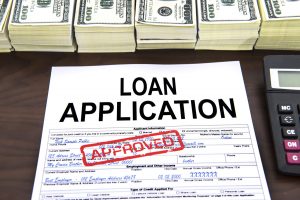If you've always wanted to get a boat, whether you're into sailing or even contemplating traveling this way or living in a houseboat, you might be thinking about a boat loan if you don't have enough cash to buy a boat upfront. Structurally, boat loans work very similarly to car notes but with a couple of key differences, and they're not as common as auto loans which can sometimes make them more difficult to find.

If your finances are organized and you're mindful of your credit score, a boat loan isn't incredibly difficult to get. It helps to have an idea of your budget, how much money you're able to put down, and credit score before you start shopping around for a boat loan.
How is a Boat Loan Different from a Car Note?
The ability to finance boats makes them more accessible to people. However, depending on where you live, it can prove to be more difficult to get a boat loan through a bank. Marine financing companies that specialize in boat loans, as well as the risk tolerance for different types of vessels, may be a surer bet than standard commercial banks where most people have checking accounts and mortgages.
Most commercial banks also finance cars since a majority of Americans need to drive where they live. Boats are simply less common, so this type of loan is harder to get. But the most notable difference between a car note and a boat loan is that the terms are far longer: the average car note is about 5-6 years according to Experian, or a more precise figure of 69.7 months, while subprime car notes are on the longer end at 72 months.
Boat loans can be financed up to 360 months (30 years) like a house, even though they depreciate much faster. This is because the amount being financed can often exceed $250,000 which is more than the median home price throughout the US. A car note is likely to be 5-8 years, a boat loan is often 10-20 years depending on the price and type of boat, while some vessels like steel-hull boats and yachts can be financed up to 30 years.
10-20% is the typical down payment expected when working with both banks and marine financing companies. However, older vessels and certain models may require a 30% down payment, whereas you can often make much smaller down payments when purchasing a car.
Types of Boat Loans
Secured
A secured boat loan operates very similarly to a car note, where your loan is backed by some type of collateral where the lender can seize the title if you end up defaulting on the loan.
In the case of car notes and secured boat loans, the lender can repossess the vehicle if you fall behind on payments. The boat itself is the collateral for this personal loan. You will also need to carry insurance for loss or damage where the lender is named as the beneficiary, as this insurance protects the lender from loss of collateral.
In addition to insurance, you may also need to have a marine survey done which is similar to a home inspection when you're buying a home. The inspector determines if the boat is safe to ride and examines the engine and other parts to see if you need to make repairs first, which may need to be financed.
Unsecured
Unlike a secured loan, the boat itself isn't collateral and no other asset (such as a home or car) is used for this purpose. This makes the loan a much riskier investment for the lender so the interest rate will be much higher than that of a secured boat loan.
Second mortgage
Some boat owners opt for a home equity loan, or second mortgage, to buy a boat. While it offers lower interest rates than an unsecured boat loan, the risk is higher than a standard secured boat loan because you can lose your home if you default on the payments.
What Credit Score is Needed for a Boat Loan?
It's best to seek out a boat loan if you have a credit score of at least 700, given that there is less leeway to buying a boat opposed to a car or home.
The average APR for a boat loan is 4-6% as of mid-2019. The better your credit score, the more favorable your loan's terms are going to be. Ultimately, the terms of your loan will also depend on other factors like the loan principal, debt-to-income ratio, and your location. But while lower credit won't necessarily stop you from being able to qualify for a boat loan so long as you can demonstrate having stable income to make the payments, a higher credit score will equate to better terms.
Can I Get a Boat Loan with a 620 Credit Score?
If you have a "fair" credit score under 700, you may have more difficulty getting a boat loan than if you have good or excellent credit at 700 or higher.
Subprime boat loans are out there, but they're harder to find and can often come with outrageous interest rates. Unsecured boat loans and manufacturer financing that functions similarly to a credit card are also the avenues more likely to be available to borrowers with fair or poor credit.
How Can I Get a Boat Loan if it's a Private Seller?
Boat dealerships will often have the most options for financing a boat: relationships with marine financing companies, acting as the liaison for manufacturer financing, and some dealerships themselves will also finance your purchase. But you may be able to get a better deal on the actual boat price by cutting out the middleman and buying a boat from an individual, or private seller.
Since you won't have the specialized financing sources available through a dealer readily available to you, going to a bank or credit union is often the most viable and favorable option if you'd like to finance a boat purchased from a private seller. The second mortgage route is available if you own your home, as is the option to borrow against your 401(k) plan if you have one. However, these options are a lot riskier in that you can not only lose your home if you default on a second mortgage, but the IRS can treat your 401(k) loan as if you withdrew the money and you may have to pay an incredibly steep amount of taxes if you become unable to repay the loan.
Your best bet when buying a used boat is to contact several different banks as well as marine financing companies to determine who will give you the best deal. Banks will also virtually always require a marine survey before agreeing to originate used boat loans.
Buying a boat has become more accessible, but it's still a huge investment like owning a house. In addition to being able to pay your loan, you also need to factor in ongoing maintenance costs like repairs, slip fees, winterization, land storage, and in some states, property taxes. Unlike the purchase price of the boat, these expenses can't be financed.



